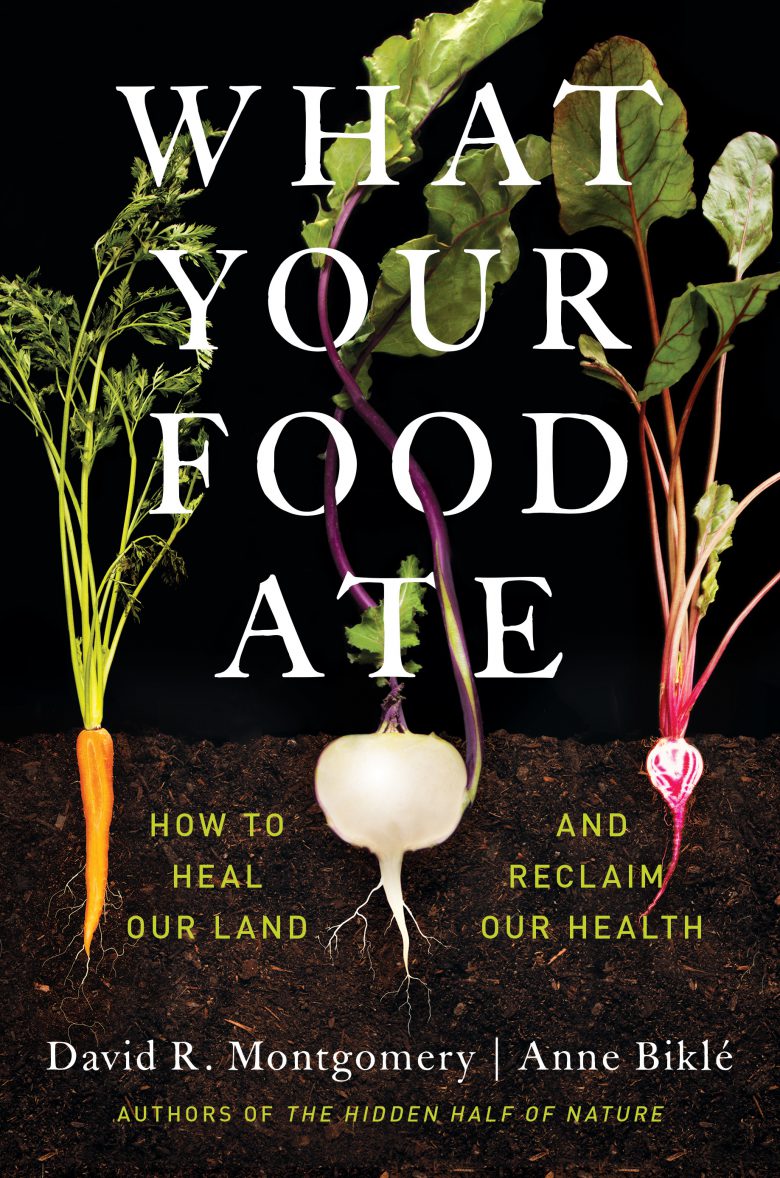What Your Food Ate
Anne Biklé and David R. Montgomery

 We’ve all heard the iconic phrase: you are what you eat. But the research we did for our forthcoming book What Your Food Ate reveals far more to this story. That carrot, cauliflower, or leafy green had to eat before it landed on your plate. And soil health is one of the chief factors that influences what your food ate. Why care about this connection or the way farming practices affect soil health? The state of the soil ripples into our bodies.
We’ve all heard the iconic phrase: you are what you eat. But the research we did for our forthcoming book What Your Food Ate reveals far more to this story. That carrot, cauliflower, or leafy green had to eat before it landed on your plate. And soil health is one of the chief factors that influences what your food ate. Why care about this connection or the way farming practices affect soil health? The state of the soil ripples into our bodies.
The heart of the connection between our health and that of the soil lies with the tiniest creatures on Earth—microbes. Millions of years ago bacteria and fungi struck up mutually beneficial relationships with the botanical world that persist to this day. These partnerships imbue crops with a long list of nutrients and compounds critical to their health—and ours. Zinc is one such nutrient. Microbes help ferry it from the soil into crops. We need it too. Zinc keeps our immune system from faltering, something we can all appreciate during a pandemic.
Soil microbes not only help deliver nutrients necessary for human health, they actually make some too. One such made-in-the-soil compound is ergothioneine (ergo). It appears to be part of the recipe for remaining healthy as we age. Farming methods that support the kinds of fungi and bacteria that make ergo are the best way to get it on our plates.
Unfortunately the health of soil on most farms suffers at the moment. In part this stems from practices that deplete what soil-dwelling organisms eat—organic matter. The hallmarks of conventional agriculture—routine plowing and fertilizer use, prodigious amounts of pesticides, and monocultures—chip away at soil organic matter, and thus soil health. It’s estimated that these kinds of practices have degraded about one third of the world’s farmland. In North America alone, about half of the natural endowment of organic matter that farms started with is gone.
Despite the gravity of the situation, there is also room for optimism. But it calls for farming in a different way. Combining just three practices—ditching the plow, using cover crops, and growing a diversity of crops—has profound and positive effects on soil health as this provides food and protection for a wide range of soil-dwelling organisms. An emerging group of “regenerative” farmers, many of whom straddle the conventional and organic worlds, are leading the way in adapting these practices to their particular soil type and crops. Most find that as their soil improves so does their bottom line.
We find hope in the growing soil health movement. Perhaps there is some common ground we can all support. After all, what’s good for the land is good for us too.
Anne Biklé is a biologist and science writer and David R. Montgomery is a MacArthur Fellow and Professor of Geomorphology at the University of Washington. They are the authors of “What Your Food Ate: How to Heal Our Land and Reclaim Our Health and several other books. Learn more about Anne & David here: dig2grow.com
Listen to Anne, David and Mark here:



